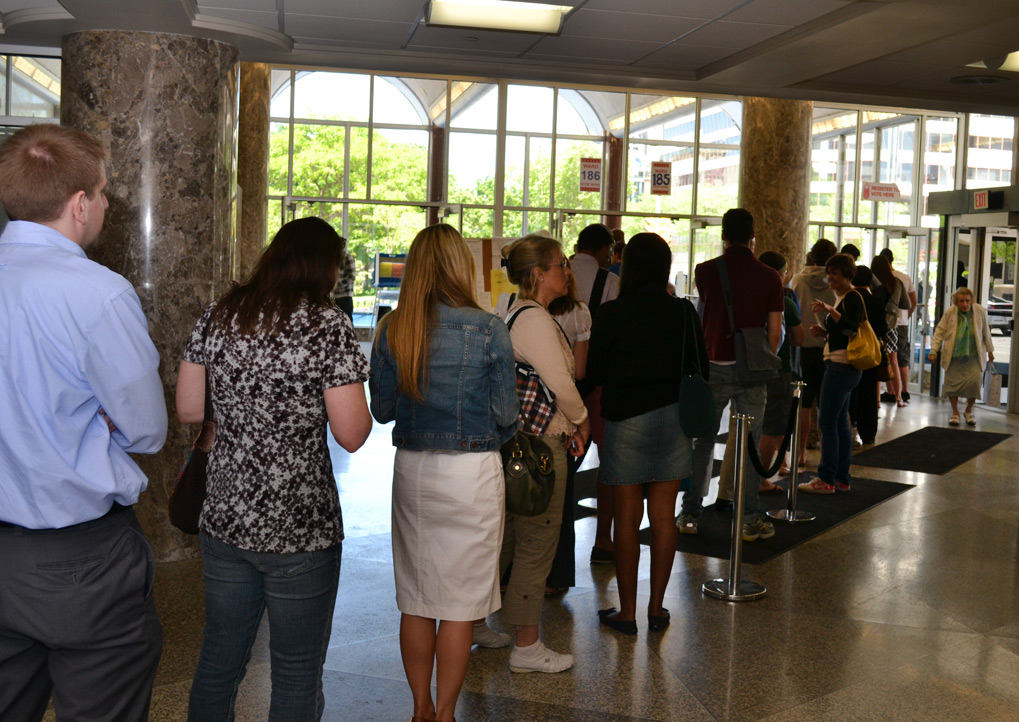All Citizens Have a Right to Vote
But will state Election Commission act to make sure that happens?
Federal courts in Wisconsin and four other states last month separately came to the same conclusion – that restrictive voting laws do nothing to improve elections, while making it difficult or even impossible for many eligible citizens to vote. In one of two Wisconsin rulings, federal district judge James Peterson wrote: “The Wisconsin experience demonstrates that a preoccupation with mostly phantom election fraud leads to real incidents of disenfranchisement, which undermine rather than enhance confidence in elections, particularly in minority communities. To put it bluntly, Wisconsin’s strict version of voter ID law is a cure worse than the disease.”
The Attorney General has vowed to appeal both Wisconsin rulings on their merits and has been granted a stay on one of the injunctions. No one will be surprised if there are more changes before the November 8 election.
The ruling by Judge Peterson, in One Wisconsin Institute v. Thomsen, makes it easier to obtain a free ID. It also resets the residency requirement for voting back to 10 days (from 28), eases restrictions on student voting and absentee voting, and allows clerks once again to hold early voting in the evening and on weekends. A separate ruling last month by federal district judge Lynn Adelman allows citizens who have difficulty obtaining an ID with reasonable effort to meet the identification requirement by signing an affidavit – but this is the injunction that has been stayed.
Regardless of what happens in the courts, most people will need to show an acceptable photo ID. It could take some time to obtain an ID, so if you need one you should apply right away. You can find instructions on the League of Women Voters of Wisconsin website or the Wisconsin Elections Commission’s “Bring It to the Ballot” website.
If you need to register to vote, save time by doing so before the election. Contact your municipal clerk for information. You can also register at your polling place on Election Day.
If there are election law changes to be implemented, it will fall to the newly formed Wisconsin Elections Commission to draft procedures. Fortunately the WEC staff has experts experienced in helping voters and local officials navigate changing laws. However, any procedures the WEC staff develops will have to be approved by the Commission. We urge the six newly appointed commissioners to agree on a solution which puts the interests of voters ahead of those of the party leaders who appointed them.
Elections are not about the political parties or the interest groups or even the candidates. They are about the voters. On Election Day we are all equal, each citizen with one vote regardless of race, creed, gender or economic status. This is how we the people move our country forward and make it stronger for future generations.
We hope the courts and the elections commissioners will remember to put voters first as they work out the future of Wisconsin election law.
Andrea Kaminski is executive director of the League of Women Voters of Wisconsin, a nonpartisan organization that advocates for informed and active participation in government. The League welcomes women and men across the state as members. With 18 local Leagues in Wisconsin and 800 affiliates across the county, the League is one of the nation’s most trusted grassroots organizations. Follow @LWV_WI on Twitter.
Op-Ed
-
Wisconsin Candidates Decry Money in Politics, Plan to Raise Tons of It
 Dec 15th, 2025 by Ruth Conniff
Dec 15th, 2025 by Ruth Conniff
-
Trump Left Contraceptives to Rot; Women Pay the Price
 Dec 8th, 2025 by Dr. Shefaali Sharma
Dec 8th, 2025 by Dr. Shefaali Sharma
-
Why the Common Council’s Amended Budget is Good Policy for Milwaukee
 Nov 20th, 2025 by Alds. Marina Dimitrijevic and Russell W. Stamper, II
Nov 20th, 2025 by Alds. Marina Dimitrijevic and Russell W. Stamper, II





















Could not agree more. All “CITIZENS” have a right to vote, early, absentee etc. But note the emphasis on “citizen” with a way to verify such. I’ll even help them get verified if they need a ride etc. I’m sure a lot of people would.
Thank God fro Voter ID, more minorities than ever are coming ou,t cause they know that their vote will now count, not buried by all the inner city fraud.
Is there hard evidence that minority turnout drastically increased after the voter ID bill went into effect?
I ask because: “The researchers analyzed turnout in recent elections — between 2008 and 2012 — in states that did and did not implement the strictest form of voter ID laws. They found that these laws consistently and significantly decreased turnout not just among traditionally Democratic-leaning groups, like blacks and Hispanics, but among Republican voters too.” https://www.washingtonpost.com/news/wonk/wp/2016/02/04/new-evidence-that-voter-id-laws-skew-democracy-in-favor-of-white-republicans/